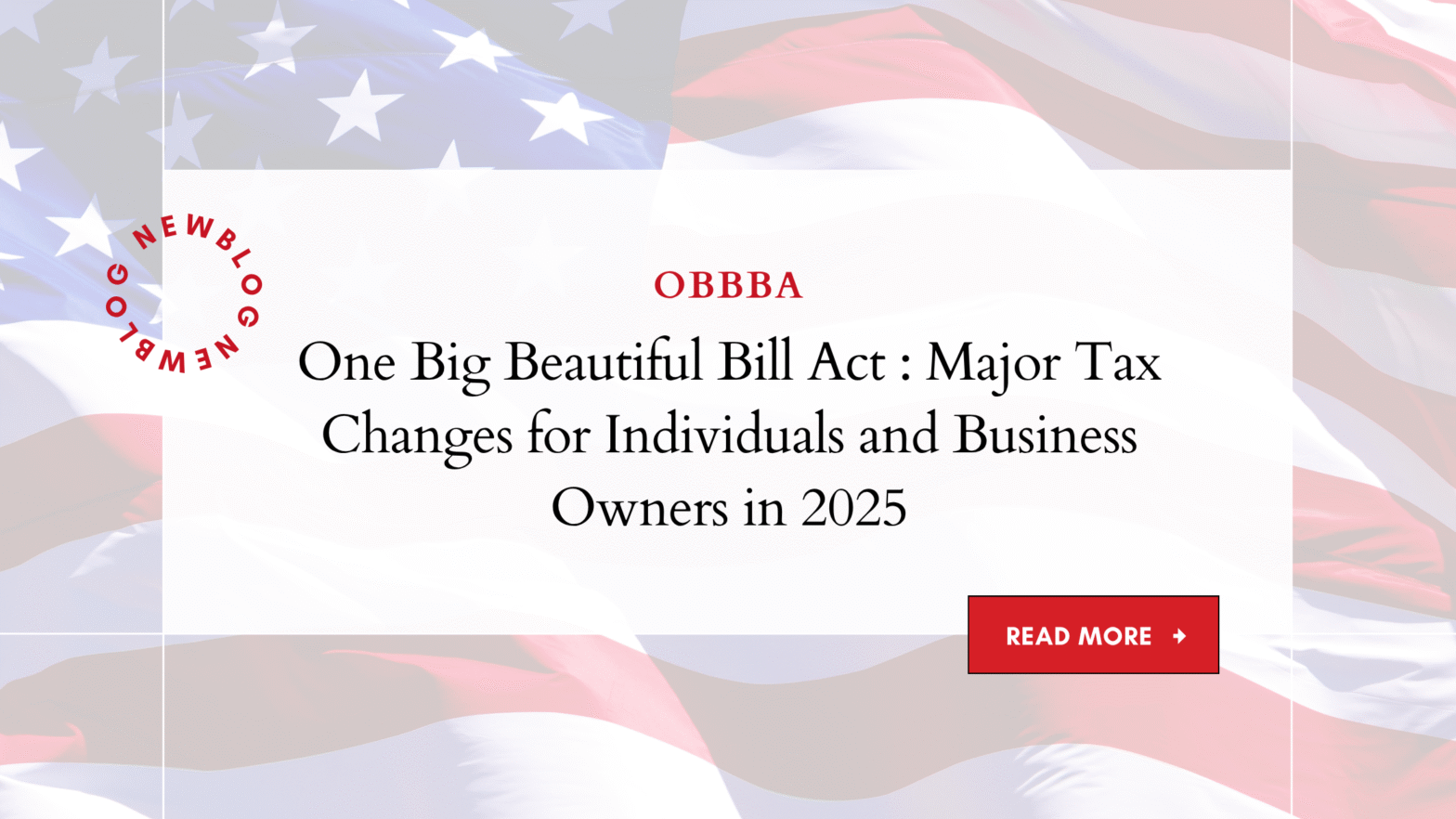The One Big Beautiful Bill Act (OBBBA) contains some of the most comprehensive federal tax reforms in recent years. The working families’ tax relief Act, as the name suggests, is intended to simplify the tax code and offer tax relief for both individuals and businesses.
Taxpayers of all kinds will be affected by these new changes, with most set to take place in 2025. Here at SG INC CPA, we’re going to cover all of the most relevant changes to know — no matter if you’re a high-income earner, small business owner, or saving for a major write-off.
Major Individual Tax Breaks and Credits
- Tax-Free Tip Income (Up to $25,000): Effective for 2025 through 2028, Tips received by employees in the service industry are now tax-free up to $25,000. The rule is designed to help workers on the front lines of service industries and to make reporting easier for many.
- Overtime Is No Longer Taxable (Up to $12,500–$25,000): Effective for 2025 through 2028, overtime is non-taxable up to $12,500 for single filers and $25,000 for joint filers.
- Higher Standard Deduction for Seniors ($6,000 Increase): Effective for 2025 through 2028, Seniors (65+) are eligible for an additional standard deduction of up to $6,000 per individual (i.e., $12,000 total for a married couple where both spouses qualify)
- Car Loan Interest Deduction ($10,000): Effective for 2025 through 2028, individuals may deduct interest paid on a loan used to purchase a qualified vehicle, provided the vehicle is purchased for personal use and meets other eligibility criteria. (Lease payments do not qualify.)
- Charitable Contributions Deduction ($1,000/$2,000, No Itemizing Required):
OBBA makes permanent and increases the tax deduction for charitable contributions made by the individuals to $1,000 for single filers (from $300) or $2,000 for joint filers (from $600 for joint filers) who do not itemize their federal income tax deductions - SALT Deduction Raised ($40,000): The Tax Cuts and Jobs Act (TCJA) capped the State and Local Tax (SALT) deduction at $10,000 ($5,000 for married individuals filing separately), which disproportionately affected taxpayers in high-tax states such as New York, California, and New Jersey.Under OBBA, the SALT deduction cap is set to increase to $40,000 for married couples filing jointly and $20,000 for married individuals filing separately. The cap will rise slightly in 2026 and continue to increase by 1% annually through 2029, before reverting to $10,000 (or $5,000 for married filing separately) in 2030.
- Mortgage Insurance Premium (PMI) Deductibility is Restored: Taxpayers can now deduct certain mortgage insurance premiums as an itemized deduction. This will be especially helpful for first-time homebuyers and real estate investors who took out low-down-payment mortgages and are required to pay mortgage insurance.
- Child Tax Credit Increased ($2,200): The Child Tax Credit is increased to $2,200 per child.
- Clean Energy Credits are Gone: The Act repeals various clean energy subsidies, including:
- The owned clean vehicle credit
- The energy-efficient home improvement credit
- The residential clean energy credit
10. “Trump Accounts” for Minors: A new type of tax-advantaged savings/investment account is being introduced. These so-called “Trump Accounts” are tax-advantaged savings accounts for a dependent minor.
Key Business Tax Breaks and Deductions
- 100% Bonus Depreciation Made Permanent: If you acquire and place in service qualified property after January 19, 2025, you can continue to expense those purchases 100% in the year they’re acquired instead of depreciating them over multiple years.
- Optional 100% Depreciation for Nonresidential Real Property: You now have the option to 100% depreciate qualifying commercial real property you place in service before January 1, 2031. This could be especially beneficial for investment in factories and manufacturing and refining facilities that could benefit the real estate construction industry overall
- Section 179 Deduction Increases to $2.5 Million: Small and mid-sized businesses are granted increased flexibility to deduct the cost of eligible equipment, software, and other tangible property.
- Domestic R&D Costs Deductible in the Year Incurred: Research and development costs incurred domestically and paid after December 31, 2024, may be fully deductible in the year they are paid — a boon for innovation-driven small businesses.
- 1099-K Threshold Raised to $20,000: Online platforms like Venmo, PayPal, eBay and other payment processors need to issue 1099-K forms only if the payee earns more than $20,000 from more than 200 transactions. The threshold was temporarily increased to $600 last year, which created headaches for small sellers.
- 1099-NEC and 1099-MISC Standard Issuance Threshold Increased to $2,000: The standard issuance threshold for 1099s has been raised to $2,000, up from $600, to reduce administrative burden.
- Expanded Employer Childcare Tax Credit: Employers are eligible to claim 40% of eligible childcare costs. Eligible small businesses can now claim a credit of 50% of eligible childcare costs. This aims to encourage companies to support working parents and offer workplace benefits.
- QBI Deduction Made Permanent: The Qualified Business Income (QBI) deduction, which allows eligible pass-through businesses to deduct up to 20% of their qualified business income, is now permanent.
New income phase-in thresholds:
- $75,000 for single/non-joint filers
- $150,000 for joint filers
The One Big Beautiful Bill Act implements a combination of tax relief, simplification, and business incentives. Individuals receive new deductions for tips, overtime and childcare expenses, while businesses benefit from new generous depreciation rules, higher 1099 thresholds and continued research and development incentives.
As always, these provisions apply differently based on your filing status, industry, and income level. Tax strategists at SG INC CPA can help you to stay current with the new provisions and proactively design a tax strategy aligned with your goals.

